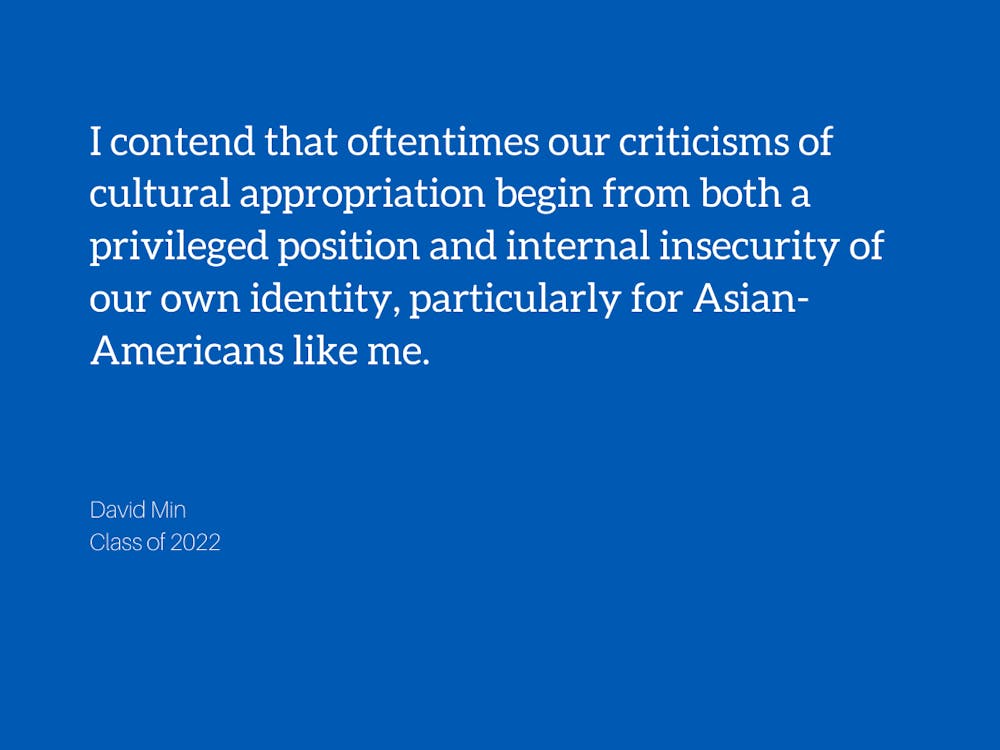Juju, the Asian tapas restaurant off Ninth Street, sucks.
I hate its overly pretentious atmosphere, its ability to convince Duke students to shell over $13 for fried rice, and the subtle hint of bigotry and inauthenticity that permeates the whole operation.
For this generation of Asians and Asian-Americans it’s easy to see something like Juju and then feel annoyed, mark it off as just another instance of cultural appropriation, and then move on in our never-ending search for more authentic cultural engagements.
However, it’s substantially harder to grapple with the question of whether society’s infatuation with Asian “fusion” restaurants, calligraphy tattoos, traditional Asian attire, and Crazy Rich Asians still improves our material conditions and social standing. I contend that oftentimes our criticisms of cultural appropriation begin from both a privileged position and internal insecurity of our own identity, particularly for Asian-Americans like me.
The common response to this question about cultural appropriation is straightforward: there is nothing inherently wrong in paying homage to a culture one admires, but authentic engagement requires respectful listening and truly attempting to understand the history and experiences of another; cultural appropriation lacks these features.
However, this analysis fails to respond to the question I’m posing.
I grew up bullied and embarrassed about bringing my mom’s cooking to school and attending Chinese school on Sundays. Those same bullies now listen to 88rising and say that their favorite food is sushi. My parents traded stability and comfort in the hope that my brother and I could succeed and were met in America with hostility and disrespect. Now our racist neighbors ask my parents about dim sum recommendations and pick their brains about traveling to Asia.
Their engagements with Asians are indeed misled and inauthentic, but so what? Yes, I wish their appreciation of my culture was legitimate. But I also don’t believe that we can possibly expect that any time soon.
I’m willing to let authenticity take a backseat—as bad as that sounds—when my entire existence has been predicated on finding a survival strategy to exist in this world; for the first time in our lives, we’ve found ourselves at the focal point of Western society’s attention in positive ways. While I’m aware that the West’s underlying assumptions about Asians have hardly changed, this newest fad certainly makes it easier to live. It’s impossible to simply ignore our material conditions. Even if these initial engagements appropriate or rely upon cultural falsehoods, they oftentimes beget more authentic experiences later on and positively alter preconceptions about a particular group.
My argument is not that we should sweep Asian-American oppression under the rug in an attempt to seem more friendly to the West but to think more critically about instances of cultural appropriation and whether they may be natural consequences of cultural pluralism or even the few surviving remnants of Asian culture in Western public life. False allegations of cultural appropriation often do more harm to “the culture” than we think; they obfuscate larger, more legitimate forms of Asian-American violence and reduce a complicated history of fetishization and stereotyping into a simple yet unpalatable phrase. Moreover, misapplications of the term may dissuade well-intentioned individuals from even interact with the culture in the first place.
The notion of authenticity itself is a matter of degree, particularly because culture and tradition are mutable and historically contingent phenomena.
The most troubling observation here is that the people who are most offended by instances of cultural appropriation are often those who are furthest from the culture itself. Younger generations, particularly the children of immigrants, tend to be more passionate about acts of appropriation because of internal insecurity about their own identities and because they too are often in the process of engaging with and learning more about their backgrounds.
Older generations are certainly more jaded, but I think that they also recognize the importance of survival in the West through means of adaptation and modification; America was not a friendly place to them and as artifacts of the “authentic” culture itself, they find the dissemination of Asian fashion, trends, and cuisine to the West particularly appealing, or at worst neutral. These generational differences suggest that it may even be problematic and neo-imperialist for younger Asian-Americans to impose Western social standards upon actual immigrants and dictate what they must conceptualize about their own identities.
I think it’s also important to draw a distinction between cultural appropriation for Asians and other identity groups for a variety of reasons. Not only are there relevant historical and contextual specificities to consider, but appropriation also occurs in significantly different ways that in turn have tremendous consequences on scale and magnitude. Generalizing my analysis to all other identity groups is both imprecise and problematic.
Please don’t reduce my argument into a monolithic bashing of cultural appropriation as a whole. Colorblind cultural exchange is impossible; great disparities in power dynamics imply that cultural exchanges occur in unethical, harmful, and neo-colonial ways. However, while it may be hard to provide a bright-line, I do believe that there are certain unavoidable instances of cultural exchange that nevertheless precipitate into more genuine interactions while simultaneously improving our day-to-day material conditions.
David Min is a Trinity sophomore. His column, milk before cereal, runs on alternate Thursdays.
Get The Chronicle straight to your inbox
Signup for our weekly newsletter. Cancel at any time.

